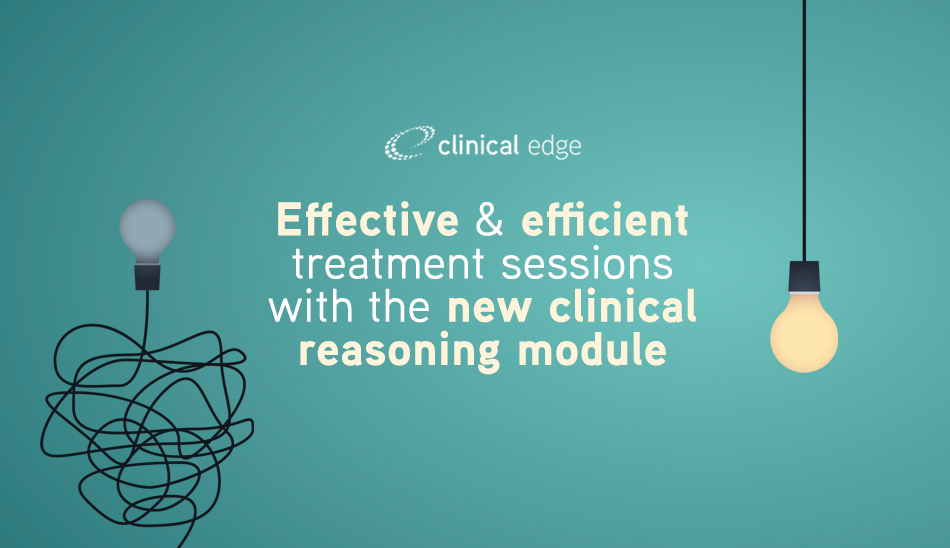Targeted questioning and clinical tests, accurate diagnosis and choosing the best treatment for the patient in front of you relies on well developed clinical reasoning. But what exactly is clinical reasoning, and how can you develop it?
To sum it up in a nutshell, clinical reasoning is effective problem solving, the ability to structure your thoughts and knowledge in order to solve patient problems efficiently and accurately.
Your patient comes to you with a problem and you find the solution.
As a clinician with well developed clinical reasoning, you have the expertise to simplify the complexities of assessment and treatment, to make the complex simple!!
You have the knowledge to be aware of all possibilities, and the skills to be able to target specific questions and clinical tests to narrow these down in an effective and efficient way. You use your assessment to guide and provide great treatment.
To help you improve your clinical reasoning, practical assessment and treatment skills and results we have developed a progressive, structured training approach to Clinical Edge membership. As a Clinical Edge member, you will receive full access to focused, in depth “modules” containing presentations that will progressively build your skills in each clinical area.
Our structured training approach to developing your clinical skills starts with the Clinical reasoning module. We’ve designed this module to progressively develop your clinical reasoning with twelve comprehensive presentations over twelve weeks from our three Clinical Edge Senior Physio educators and presenters - Simon Olivotto (Specialist Musculoskeletal Physiotherapist, FACP), Jordan Craig (Titled Musculoskeletal & Sports Physio) and David Toomey (Musculoskeletal Physio & PhD Candidate). Each presentation will incorporate clinical tips & practice points, with case studies throughout to help you apply your new knowledge with your patients.
In this module, you’ll discover:
- How to use clinical reasoning to simplify complex presentations.
- How to perform an effective and efficient assessment in limited consult times.
- Clinical patterns of different musculoskeletal, systemic and biopsychosocial presentations that you can recognise in your patient presentations, to help guide your assessment, diagnosis, prognosis and treatment.
- How to improve your clinical reasoning at each point in your career.
- How to use your objective assessment to guide effective treatment and avoid “treatment recipes”.
- How to identify and remove biases that are interfering with your clinical results.
- How to use the best available evidence to save time and energy as an evidence-informed clinician.
- Prognostic indicators that you can use to identify how long your patient’s recovery will take and when they will be able to return to work, activity and sport.
You’ll develop your clinical reasoning to nail the problem your patient has presented with, achieve better results with your patients, and really make a difference to your patients life.
CLICK HERE to improve your clinical reasoning with a free trial Clinical Edge membership
Now available - Presentation 1 - Sharpening your most important clinical tool - Introducing clinical reasoning strategies to transform your practice
Do you ever feel overwhelmed when you have a complex patient presentation? Do you wonder which tests to perform when your patient has multiple pain areas, reporting low back, hip, bilateral posterior leg pain, bilateral knee pain and bilateral ankle pain? Are these related or different problems? How can you find out with your subjective history and assessment?
Do you ever run out of time in a treatment session, and resort to the same treatment you normally use for patients with pain in this area, a treatment recipe or the treatment you learned on your last course?
In this presentation with Simon Olivotto (Specialist Musculoskeletal Physiotherapist, FACP) you’ll:
- Discover how to develop your clinical reasoning to simplify complex presentations.
- Develop clarity and the structure to solve the most complex problems with ease.
- Learn how to work efficiently and with clinical precision even in very limited consult times.
- Develop thinking skills and habits to differentiate you from your peers.
- Adopt effective habits and strategies used by expert clinicians to achieve excellent treatment outcomes.
- Explore clinical scenarios, with effective clinical strategies and tips you can easily implement into your practice.
- Discover clinical reasoning frameworks you can use with your patients.
- Improve your results with even the most complex clients.
- Help make your work fun and fulfilling again.
This presentation is the first in your clinical reasoning module. In Presentation 2 available next week, Jordan Craig will take you through his clinical reasoning journey, and how you can develop your clinical reasoning at each point in your career.

